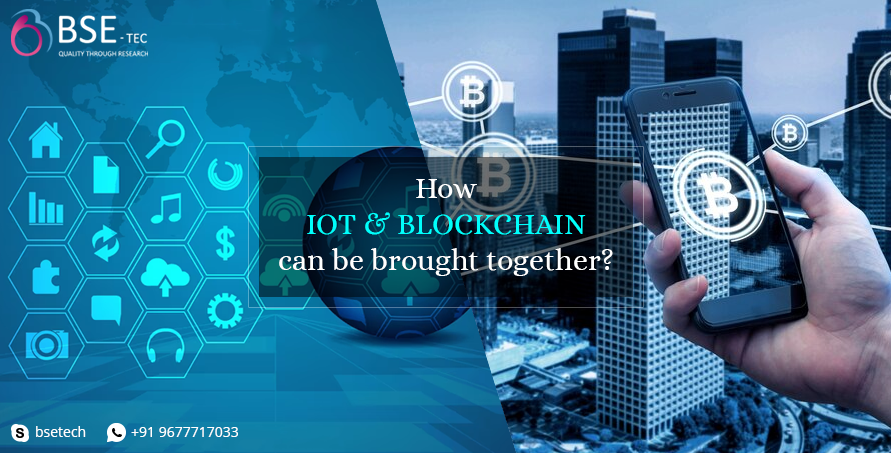How can IoT and blockchain be brought together?

IoT refers to sensors embedded in physical devices, physical devices, vehicles, appliances and other physical objects. IoT devices include smartwatches, smartphones, sensor-enabled doors in shopping malls and so on. Whereas blockchain is a distributed and digitalized ledger that records transactions. Can this IoT (Internet of Things) and blockchain be brought together? Yes, IoT empowers devices across the internet to transmit data to private blockchain networks for creating tamper-resistant records of shared data. Here are some of the benefits of seamlessly integrating these technological advancements.
How does Blockchain enhance the security, privacy, and efficiency of IoT networks?
- IoT devices which may be pieces of hardware, such as sensors, actuators, gadgets, appliances, or machines, that are programmed for certain applications and can transmit data over the internet or other networks which use blockchain technology to communicate more securely with each other. Blockchain’s decentralized and tamper-proof nature ensures that the data transmitted between devices remains secure and cannot be altered by malicious actors.
- Blockchain ensures the integrity and authenticity of IoT data. Each data transaction can be recorded on the blockchain, creating an immutable record of the data’s origin, timestamp, and any modifications made to it. This helps in verifying the accuracy and reliability of IoT data.
- Smart contracts are self-executing agreements that automatically trigger predefined actions when specific conditions are met. Blockchain’s smart contract capabilities can be utilized in IoT networks to automate processes, such as device-to-device transactions, without the need for intermediaries.
Use Case: IoT in the Oil and Gas Sector
How can Blockchain and IoT technologies drive digital transformation in the oil and gas sector?
Blockchain and IoT technologies have the potential to impact the oil and gas industry by improving operational efficiency, reducing costs, enhancing transparency, and enabling new business models.
Actions of IoT and Blockchain
For example, The journey of crude oil begins from where it is stored in reservoirs → transferred to a specific granary, manually measured to record the entries, from granary → to tankers → retail petrol bunks→ retail market → vehicle and the journey ends, Do you think this is the simplest way of tracking the goods? Measure units produced /transferred to reservoirs/ stored in granary/ tanks/shipped to bunks? No way, quite a bit of tedious work like eyewatches and stop clocks.
How can blockchain technology and IoT contribute?
Here comes Supply Chain Management where blockchain can provide a transparent and secure platform for tracking and verifying the movement of goods and materials across the supply chain.
Can we track the goods’ condition?
Of course you can, by integrating IoT sensors, many companies try to collect real-time data on inventory levels, temperature, pressure, and other critical parameters, ensuring compliance and reducing the risk of fraud or theft which can be done more accurately by avoiding human manual entries.
IoT devices monitor the condition and performance of oil and gas assets, such as pipelines, refineries, and drilling equipment. By connecting these devices to a blockchain network, large and small companies can create a tamper-proof record of asset maintenance, repair history, and usage that executes the asset’s lifespan.
Also, IoT devices measure energy consumption and production in real-time, allowing for accurate billing and settlement where all the data are stored in Smart contracts on the blockchain can automate the entire process, eliminating the need for intermediaries and reducing transaction costs. Thus blockchain enables peer-to-peer energy trading between oil and gas producers, distributors, and consumers.
Do IoT and blockchain assist safety protocols?
Yes, IoT sensors and blockchain enhance safety and compliance in the oil and gas industry. For example, sensors can monitor environmental conditions, detect leaks or spills, and trigger automated responses. The data collected by these sensors can be securely stored on a blockchain, providing auditable records for regulatory compliance and ensuring transparency to the company. Also, Blockchain enables secure and decentralized data sharing among different stakeholders in the oil and gas ecosystem to facilitate collaboration, improve decision-making, and drive innovation in respective industries.
Overall, Nearly 15%-23% of the companies have implemented the combination of blockchain and IoT technologies that provide enhanced security, transparency, and efficiency in various domains like the Oil and gas industry, Logistics, Healthcare and much more with new possibilities for decentralized and autonomous IoT networks. Deciding to streamline your operations, and safety improvement with cost cuts down? Reach BSEtec Leading blockchain development company to upgrade with new business models.
Did you find this article useful? Let us know by leaving a comment below, or join us on Twitter and Facebook.




